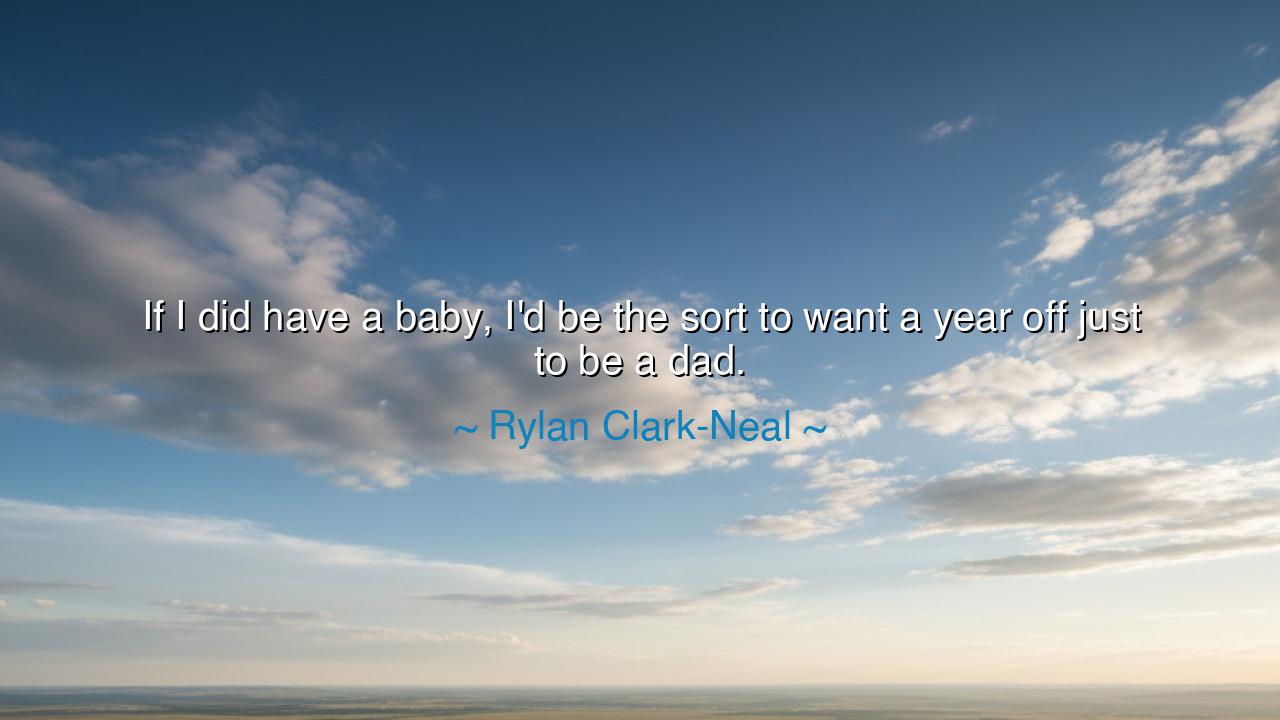
If I did have a baby, I'd be the sort to want a year off just to






In a world that often rushes past the tender things of life, Rylan Clark-Neal once spoke words both humble and profound: “If I did have a baby, I'd be the sort to want a year off just to be a dad.” At first glance, this may seem a simple longing — a wish for time, for quiet, for family. But within it lies a truth ancient and sacred: that the highest calling of any human being is not the pursuit of fame or labor, but the devotion of love and presence. In this confession, Clark-Neal honors the art of fatherhood — not as duty or role, but as a sacred season, a chance to dwell fully in the mystery of life’s beginning.
From the earliest ages, the wise have known that time is the true currency of love. A father may give his child food, shelter, or protection, yet nothing nourishes the soul like presence — the simple act of being there. When Clark-Neal speaks of wanting a year simply to “be a dad,” he is not rejecting work or ambition; he is naming the longing that lives in every heart that has tasted both success and solitude — the yearning to return to what is most real. In a world that measures worth by motion, he reminds us that the greatest work is often done in stillness, in watching a child’s first steps, in learning again the rhythm of wonder.
The ancients themselves revered this truth. In old China, Confucius taught that to cultivate virtue, one must first honor family — for the root of all wisdom is found in care and relationship. And in the days of the Romans, the philosopher Seneca wrote that a man who is too busy to love is poorer than the beggar who cherishes his child. History teaches that civilizations rise and fall not by the strength of their empires, but by the love within their homes. To take time for fatherhood, then, is not weakness — it is wisdom, for it is in the nurturing of life that the spirit of a people endures.
Consider the story of Marcus Aurelius, emperor and philosopher, who ruled over vast lands yet often wrote in his journals of his regret — that he could not spend more time with his children, that the affairs of empire had stolen the hours of tenderness. His writings reveal the eternal tension between duty and presence, between the outer crown and the inner heart. What Rylan Clark-Neal speaks of is the opposite of this regret — the dream of living fully in those moments that cannot be replaced. For there is no fame, no fortune, no crown that equals the weight of a sleeping child in one’s arms.
To be a father, in its truest sense, is to become a bridge between generations — to give without seeking return, to love without condition. It is to step out of the race of the world and dwell, even for a time, in the circle of creation itself. Clark-Neal’s imagined year off is not idleness, but reverence — a recognition that parenthood is not merely another chapter of life, but a transformation of the soul. To raise a child is to rediscover the universe through innocent eyes; to teach is to learn anew the meaning of patience, humility, and joy.
Yet in our age of haste, few have the courage to pause. The world demands that we produce and perform, even when the heart longs to nurture and rest. In this, Clark-Neal’s words stand as quiet rebellion — a reminder that to slow down is not to fall behind, but to move closer to what truly matters. The act of fatherhood, like the tending of a garden, cannot be rushed; it requires seasons of watching, of listening, of being fully present. For a year spent in love is worth more than a lifetime spent in distraction.
The lesson, then, is clear: cherish the time that cannot return. Whether one is a parent or not, every soul must learn the sacred art of presence — to give the fullness of one’s heart to those moments that shape eternity. If life is a song, then love is its refrain, and it must be sung not in haste but in harmony. Let each person, then, honor the call to slow down, to listen, to be there — for another, for oneself, for the pulse of life itself.
So remember, my children of tomorrow: when the world urges you to chase success, turn your gaze instead to the faces of those you love. Follow the wisdom of Rylan Clark-Neal, who, in longing to “be a dad,” reminds us that the truest measure of greatness lies not in what we build, but in what we nurture. The work of love is the work of eternity — and those who choose it, even for a year, are the builders of heaven on earth.






AAdministratorAdministrator
Welcome, honored guests. Please leave a comment, we will respond soon